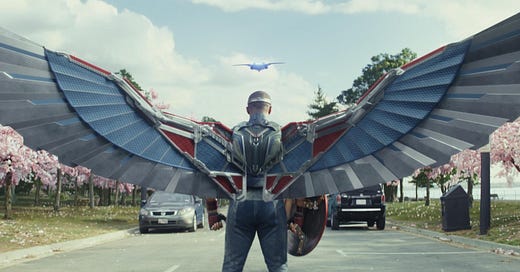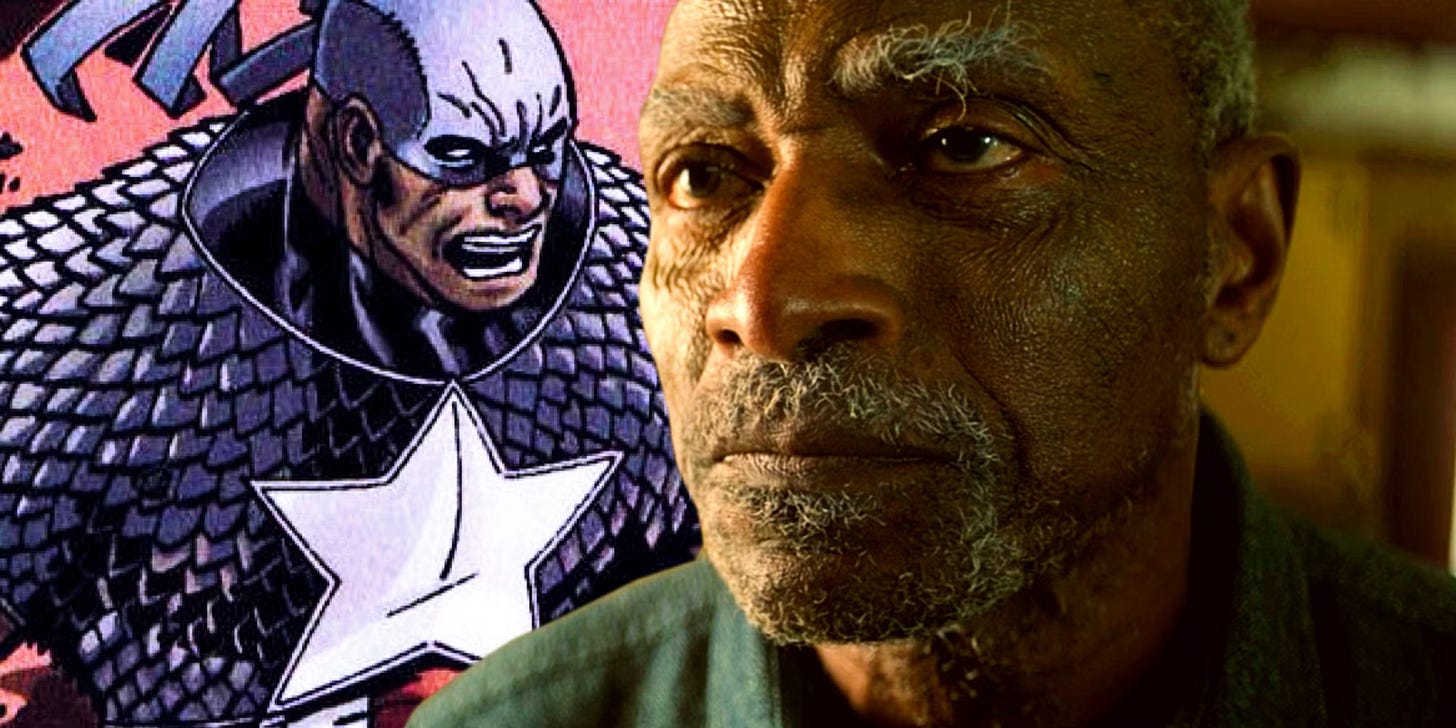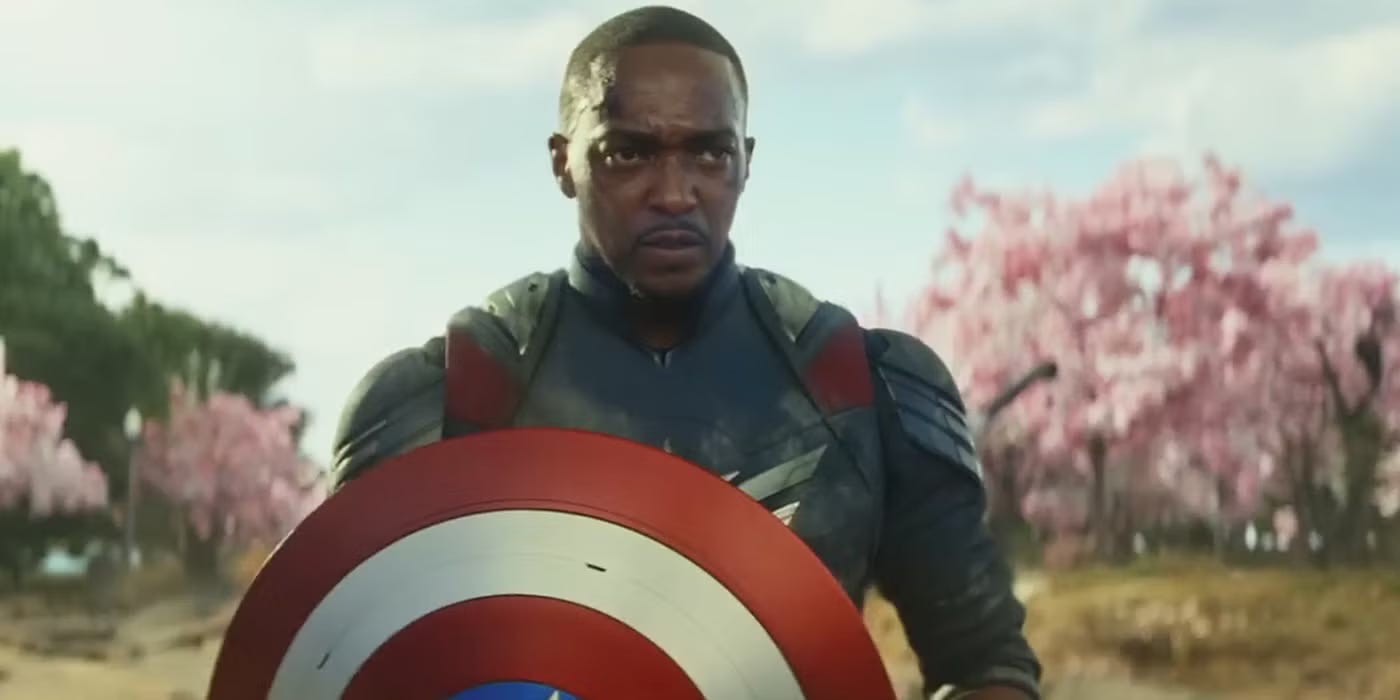Let's face it: Captain America: Brave New World is a complete mess.
It has been a letdown for many fans, but it should be especially so for black folks who were eagerly anticipating a meaningful continuation of Sam Wilson's journey as Captain America. The film fails to address critical themes introduced by its predecessor, The Falcon and the Winter Soldier, and its production issues have overshadowed the historic moment of Anthony Mackie becoming the first black Captain America. Moreover, the movie strays from the Captain America franchise, instead serving as a sequel to The Incredible Hulk.
A Black Captain America??
One of the most compelling aspects of The Falcon and the Winter Soldier was its exploration of what it means for a Black man to take on the mantle of Captain America. The series delved into themes of racism, identity, and the societal implications of a black superhero embodying American ideals. It posed crucial questions about whether America was ready to accept a black Captain America, and how this shift would be perceived by the public. However, Captain America: Brave New World sidesteps these issues entirely, failing to provide any meaningful commentary or resolution.
A significant part of this narrative gap involves the character of Isaiah Bradley, a black super soldier who was subjected to inhumane experiments by the U.S. government. His story, which parallels the real-life Tuskegee Syphilis Study, highlights the systemic abuse and neglect faced by black men in America, in the name of scientific progress. In the comics and the series, Isaiah Bradley was part of a group of black soldiers who were forced into experiments with a flawed version of the super-soldier serum. Most of these soldiers died, while Bradley survived, only to be imprisoned and further experimented upon. His story serves as a powerful metaphor for the exploitation and erasure of black heroes in America.
Despite its potential to explore these themes, Brave New World fails to engage with Isaiah Bradley's narrative or its implications. He’s there, but he’s not.
By ignoring this aspect of the Captain America universe, the film misses an opportunity to delve into the complexities of race and heroism, leaving audiences without a thoughtful exploration of how Sam Wilson's role as Captain America challenges or reinforces societal norms. This oversight is particularly disappointing given the potential for Brave New World to continue the nuanced discussion started by The Falcon and the Winter Soldier.
At no point are audiences invited to deal with the reality that in America, black bodies have been used for white purposes. What started as slavery and continued through events like Tuskegee and even the little known fact that a black woman was the first to receive a COVID vaccine, continues. Black Americans have served the United States as its bipedal lab rats since our founding, only to receive disdain for our efforts.
It was there for Brave New World to explore. They introduced the topic. They just lacked the backbone to carry it through.
Rewrites and Reshoots
The production of Captain America: Brave New World was marred by extensive rewrites and reshoots. While reshoots are common in large-scale productions, the scale and frequency of those for Brave New World suggest significant creative indecision. This indecisiveness not only affects the overall quality of the film but also undermines Anthony Mackie's historic role as the first black Captain America.
Mackie's portrayal of Sam Wilson was a milestone moment for representation in the Marvel Cinematic Universe (MCU). However, the numerous rewrites and reshoots may have diluted the impact of his character's journey. The constant changes likely disrupted the narrative flow and character development, potentially diminishing the significance of Mackie's performance. This mismanagement does a disservice to Mackie and the importance of his role, as it fails to provide a cohesive and powerful story that honors the legacy of Captain America while also celebrating its new direction.
To me, Brave New World is part of a long-standing issue where Black people are given second-rate material and then blamed for not achieving first-rate outcomes. It's a pattern that's all too familiar in many areas of life, from education to entertainment. We're often handed incomplete or poorly developed projects (schools, resources, etc…) and expected to make them shine, only to be criticized when they don't meet expectations. This cycle perpetuates a narrative that black talent, minds, skills and so on is less capable, rather than acknowledging the systemic issues that hinder success.
This film is a prime example of how this pattern plays out in Hollywood. By not fully investing in the story of a black Captain America and instead focusing on other plotlines, and the committee nature of writing and narrative, the filmmakers missed an opportunity to create something truly impactful. The result is a movie that feels disconnected from its potential and leaves audiences wondering what could have been if the project had been given the attention and care it deserved.
Drifting Away from Captain America
Brave New World also disappoints by not being a true Captain America film. This movie could’ve been about a black man taking the mantle of Captain America, but both the trailer and the movie focus on a white President getting mad.
Brave New World serves as a sequel to The Incredible Hulk, incorporating elements from that franchise rather than focusing on the core themes and characters of Captain America. This narrative shift alienates fans who were expecting a continuation of the Captain America story, particularly those invested in Sam Wilson's journey as the new Captain America.
By diverting attention to Hulk-related plotlines, the film loses sight of what makes Captain America compelling: the exploration of patriotism, duty, and the moral complexities of heroism. This deviation undermines the potential for Brave New World to explore new dimensions of the Captain America character, especially in the context of Sam Wilson's experiences as a black man in America. Sam Wilson ends up not demonstrating any of those virtues and instead is a good soldier in an Iron Man suit with Wakandan technology.
In The End
The disappointment with Captain America: Brave New World stems not just from its production issues or narrative missteps but from its failure to engage with meaningful themes and its mishandling of a historic moment for representation in the MCU. By ignoring the questions posed by The Falcon and the Winter Soldier, undermining Anthony Mackie's role through rewrites and reshoots, and drifting away from the core of the Captain America franchise, the film misses opportunities to resonate with and communicate the the black American experience and contribute positively to the ongoing conversation about race and identity in America.
In a time when representation matters more than ever, Captain America: Brave New World (and we know it matters because it is meeting so much resistance) falls short of its potential to inspire and challenge societal norms. It leaves fans and critics alike wondering what could have been if the film had stayed true to its roots and honored the legacy of Captain America while embracing the new perspectives that Sam Wilson brings to the role.






